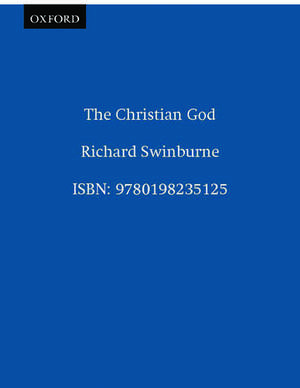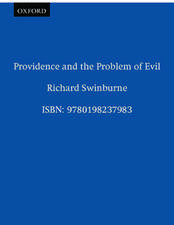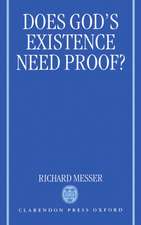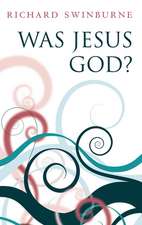The Christian God
Autor Richard Swinburneen Limba Engleză Paperback – 6 oct 1994
Preț: 332.14 lei
Preț vechi: 386.20 lei
-14% Nou
Puncte Express: 498
Preț estimativ în valută:
63.55€ • 66.53$ • 52.59£
63.55€ • 66.53$ • 52.59£
Carte tipărită la comandă
Livrare economică 26 martie-01 aprilie
Preluare comenzi: 021 569.72.76
Specificații
ISBN-13: 9780198235125
ISBN-10: 0198235127
Pagini: 276
Dimensiuni: 139 x 217 x 16 mm
Greutate: 0.36 kg
Ediția:New.
Editura: OUP OXFORD
Colecția OUP Oxford
Locul publicării:Oxford, United Kingdom
ISBN-10: 0198235127
Pagini: 276
Dimensiuni: 139 x 217 x 16 mm
Greutate: 0.36 kg
Ediția:New.
Editura: OUP OXFORD
Colecția OUP Oxford
Locul publicării:Oxford, United Kingdom
Recenzii
Like his previous works it is marked by the application of philosophically rigorous argumentation to the defence of a broadly orthodox position. This book constitutes a major contribution to philosophical thinking on the divine nature which academic theology will engage with for many years to come.
It is a book for those readers interested in the philosophy of religion ... With its sustained, progressive and convincing arguments the book is also the equivalent of a first-class dictionary of the terms of systematic theology and the philosophy of religion.
The debate about theism's self-understanding should be greatly enhanced.
Swinburne's achievement - and it is no mean one - is to give a coherent contemporary account of Christian theism.
The Christian God will offer much of interest to the analytical philosopher of religion.
This book is an elegant, incisive, provocative, lucid and concise masterpiece ... it should be required reading for theologians, both to show how difficult their discipline really is, and to expose the absurdity of the claim, still sometimes heard from non-philosophers, that metaphysics is finished ... the book is clear and powerful in argument. It is merciless to woolliness of thought, and it presents views which demand to be taken account of by contemporary theologians. It treats theology as a discipline demanding rigour. Much of it, Christians will surely think, is true, and all of it is worth-while and supremely well said, with the icy clarity and relentless precision that is the mark of much Oxford philosophy. For once the blurb is right: this will no doubt become a classic in the philosophy of religion.
His argumentation is subtle and based on extremely careful groundwork, the implications of which only gradually unfold as the work progresses.
An impressive work of sustained argumentation. Swinburne commands a very wide range of philosophical and theological ideas and never shuns hard thinking ... Swinburne's style remains crystal clear.
It must be admitted that some effort must be made to understand Christian tradition in a coherent way, and that is precisely what Swinburne does. The book is therefore much to be welcomed as a thoroughly contemporary contribution to philosophy and systematic theology.
Swinburne has become one of the eminent and celebrated practitioners of the philosophy of religion. Here, as in his other books, one finds an exceptionally careful, fresh, well-reasoned, and balanced exploration of fundamental human and religious issues.
In this the third volume of his magisterial series on the philosophy of Christian doctrine, Swinburne deals with belief in the Trinity and the Incarnation. ... Unfortunately, immense scholarly erudition is incompatible neither with intellectual imcompetance nor with triviality of mind; obviously it would be invidious to cite examples, but they are legion. This only serves to set in relief Swinburne's combination of philosophical power, detailed knowledge of orthodox Christian doctrine, and just appreciation of its intellectual riches, for it is as admirable as it is rare.
Swinburne ... follows in this book his preferred pattern of dealing first with philosophical issues, and then applying his philosophical conclusions in a thorough, systematic and concise way to theological issues ... The Christian God is part of a series, a piece of a larger philosophical argument for the faith. However, the work is ultimately self-sufficient, and a reader with a good philosophical background or aptitude can approach The Christian God on its own terms. The book is a central work by one of the leading philosophers of religion of our day. It will be a necessary part of any college, university, or seminary library, and it will be profitably read by anyone who thinks seriously about the attributes of God and about the doctrines of the Trinity and the Incarnation.
It is a book for those readers interested in the philosophy of religion ... With its sustained, progressive and convincing arguments the book is also the equivalent of a first-class dictionary of the terms of systematic theology and the philosophy of religion.
The debate about theism's self-understanding should be greatly enhanced.
Swinburne's achievement - and it is no mean one - is to give a coherent contemporary account of Christian theism.
The Christian God will offer much of interest to the analytical philosopher of religion.
This book is an elegant, incisive, provocative, lucid and concise masterpiece ... it should be required reading for theologians, both to show how difficult their discipline really is, and to expose the absurdity of the claim, still sometimes heard from non-philosophers, that metaphysics is finished ... the book is clear and powerful in argument. It is merciless to woolliness of thought, and it presents views which demand to be taken account of by contemporary theologians. It treats theology as a discipline demanding rigour. Much of it, Christians will surely think, is true, and all of it is worth-while and supremely well said, with the icy clarity and relentless precision that is the mark of much Oxford philosophy. For once the blurb is right: this will no doubt become a classic in the philosophy of religion.
His argumentation is subtle and based on extremely careful groundwork, the implications of which only gradually unfold as the work progresses.
An impressive work of sustained argumentation. Swinburne commands a very wide range of philosophical and theological ideas and never shuns hard thinking ... Swinburne's style remains crystal clear.
It must be admitted that some effort must be made to understand Christian tradition in a coherent way, and that is precisely what Swinburne does. The book is therefore much to be welcomed as a thoroughly contemporary contribution to philosophy and systematic theology.
Swinburne has become one of the eminent and celebrated practitioners of the philosophy of religion. Here, as in his other books, one finds an exceptionally careful, fresh, well-reasoned, and balanced exploration of fundamental human and religious issues.
In this the third volume of his magisterial series on the philosophy of Christian doctrine, Swinburne deals with belief in the Trinity and the Incarnation. ... Unfortunately, immense scholarly erudition is incompatible neither with intellectual imcompetance nor with triviality of mind; obviously it would be invidious to cite examples, but they are legion. This only serves to set in relief Swinburne's combination of philosophical power, detailed knowledge of orthodox Christian doctrine, and just appreciation of its intellectual riches, for it is as admirable as it is rare.
Swinburne ... follows in this book his preferred pattern of dealing first with philosophical issues, and then applying his philosophical conclusions in a thorough, systematic and concise way to theological issues ... The Christian God is part of a series, a piece of a larger philosophical argument for the faith. However, the work is ultimately self-sufficient, and a reader with a good philosophical background or aptitude can approach The Christian God on its own terms. The book is a central work by one of the leading philosophers of religion of our day. It will be a necessary part of any college, university, or seminary library, and it will be profitably read by anyone who thinks seriously about the attributes of God and about the doctrines of the Trinity and the Incarnation.
















